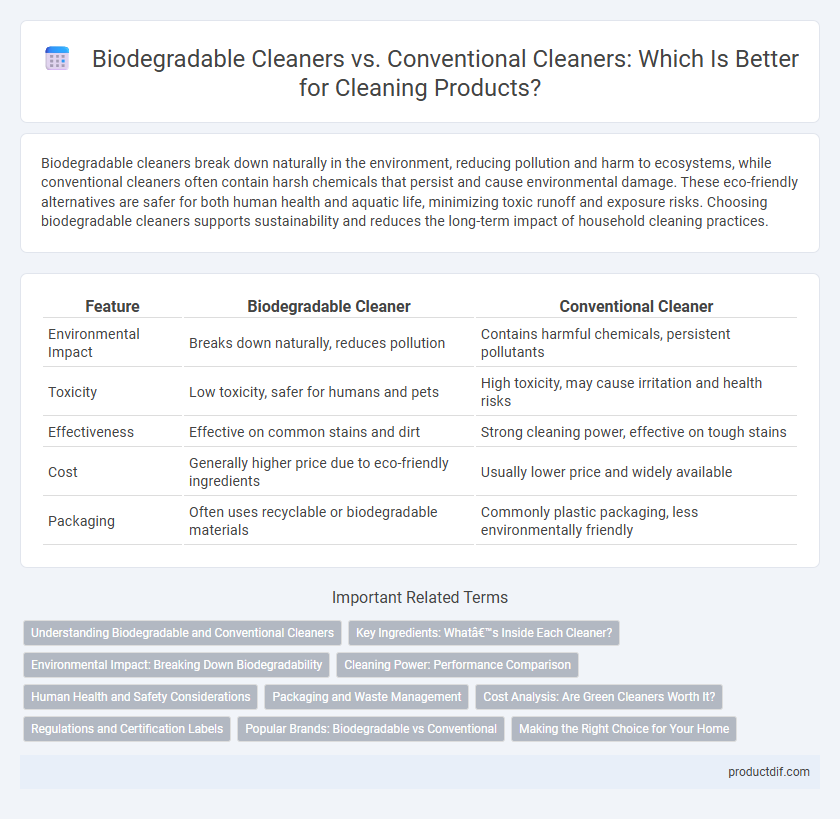Biodegradable cleaners break down naturally in the environment, reducing pollution and harm to ecosystems, while conventional cleaners often contain harsh chemicals that persist and cause environmental damage. These eco-friendly alternatives are safer for both human health and aquatic life, minimizing toxic runoff and exposure risks. Choosing biodegradable cleaners supports sustainability and reduces the long-term impact of household cleaning practices.
Table of Comparison
| Feature | Biodegradable Cleaner | Conventional Cleaner |
|---|---|---|
| Environmental Impact | Breaks down naturally, reduces pollution | Contains harmful chemicals, persistent pollutants |
| Toxicity | Low toxicity, safer for humans and pets | High toxicity, may cause irritation and health risks |
| Effectiveness | Effective on common stains and dirt | Strong cleaning power, effective on tough stains |
| Cost | Generally higher price due to eco-friendly ingredients | Usually lower price and widely available |
| Packaging | Often uses recyclable or biodegradable materials | Commonly plastic packaging, less environmentally friendly |
Understanding Biodegradable and Conventional Cleaners
Biodegradable cleaners break down naturally through microbial activity, minimizing environmental impact by reducing toxic residues and pollution. Conventional cleaners often contain synthetic chemicals that persist in ecosystems, contributing to water contamination and harm to aquatic life. Understanding the chemical composition and environmental footprint of each type guides consumers toward more sustainable cleaning choices.
Key Ingredients: What’s Inside Each Cleaner?
Biodegradable cleaners contain natural enzymes, plant-based surfactants, and organic solvents that break down pollutants without harming the environment. Conventional cleaners often rely on synthetic chemicals like phosphates, ammonia, and chlorine-based compounds, which may contribute to water pollution and toxicity. Choosing biodegradable options reduces chemical residue and supports safer disposal, aligning with eco-friendly cleaning standards.
Environmental Impact: Breaking Down Biodegradability
Biodegradable cleaners decompose naturally through microbial activity, reducing harmful residues in soil and water ecosystems compared to conventional cleaners that often contain persistent chemicals. These cleaners minimize environmental pollution by breaking down into non-toxic compounds, promoting healthier aquatic life and soil quality. Choosing biodegradable products supports sustainable waste management and lowers the overall ecological footprint of household and industrial cleaning practices.
Cleaning Power: Performance Comparison
Biodegradable cleaners often contain plant-based enzymes and natural surfactants that effectively break down organic stains, providing competitive cleaning power compared to conventional cleaners. Conventional cleaners usually rely on synthetic chemicals like surfactants and solvents, which offer strong grease and grime removal but may leave harmful residues. Recent studies show biodegradable formulas can match conventional products in performance while supporting environmental sustainability and reducing toxicity.
Human Health and Safety Considerations
Biodegradable cleaners significantly reduce exposure to harmful chemicals, minimizing respiratory irritation and skin allergies compared to conventional cleaners, which often contain volatile organic compounds (VOCs) and toxic substances. These eco-friendly products break down naturally without leaving hazardous residues, enhancing indoor air quality and reducing long-term health risks. Conventional cleaners, while effective, pose greater safety concerns due to their chemical toxicity, increasing the potential for acute poisoning and chronic health issues in frequent users.
Packaging and Waste Management
Biodegradable cleaners often feature eco-friendly packaging made from recycled or biodegradable materials, reducing plastic waste and environmental impact. Conventional cleaners typically use plastic containers that contribute to landfill accumulation and require more complex recycling processes. Effective waste management for biodegradable products involves composting or recycling, whereas conventional cleaner packaging demands specialized facilities to mitigate pollution.
Cost Analysis: Are Green Cleaners Worth It?
Biodegradable cleaners often have a higher upfront cost compared to conventional cleaners but can lead to long-term savings through reduced environmental impact and lower disposal fees. Studies show the total cost of ownership for green cleaners may be offset by decreased health-related expenses and regulatory compliance costs. Evaluating factors like lifecycle costs, environmental benefits, and potential tax incentives reveals that investing in biodegradable cleaning products can be economically advantageous over time.
Regulations and Certification Labels
Biodegradable cleaners undergo rigorous testing to meet environmental regulations such as the EPA's Safer Choice program and often feature certification labels like USDA Biobased or Ecocert, ensuring reduced ecological impact. Conventional cleaners typically comply with general safety standards but lack specialized eco-friendly certifications, which limits transparency regarding environmental and health effects. Certification labels on biodegradable cleaners provide consumers with verified information on biodegradability, non-toxicity, and sustainable sourcing, aligning with stricter regulatory demands for sustainability.
Popular Brands: Biodegradable vs Conventional
Popular biodegradable cleaner brands such as Seventh Generation, Method, and Ecover emphasize environmentally friendly ingredients that break down naturally without harming ecosystems. Conventional cleaner brands like Lysol, Clorox, and Mr. Clean often contain strong chemicals that provide powerful disinfection but pose risks to water quality and human health. Consumer preference increasingly shifts toward biodegradable cleaners due to growing awareness of sustainability and regulatory pressures promoting safer alternatives.
Making the Right Choice for Your Home
Biodegradable cleaners break down naturally without harming the environment, making them a safer choice for households focused on sustainability. Conventional cleaners often contain harsh chemicals that can linger on surfaces and pose health risks to pets and children. Prioritizing biodegradable options reduces toxic exposure and supports eco-friendly home maintenance.
Biodegradable Cleaner vs Conventional Cleaner Infographic

 productdif.com
productdif.com